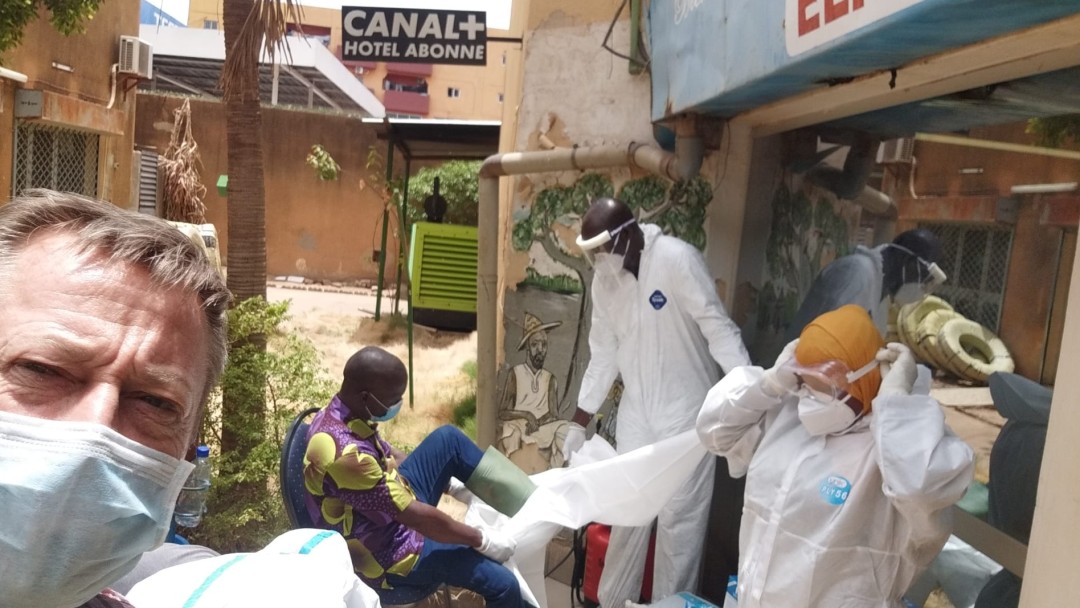News from 2021-02-10 / KfW Development Bank
ECOWAS: Support during the pandemic
KfW finances support for laboratories in West Africa

Since the last Ebola epidemic in West Africa, KfW has been supporting the Economic Community of West African States (ECOWAS) in the procurement of laboratory equipment. It is now extending this support to contain COVID 19 by increasing the current pandemic control project with ECOWAS by EUR 5.72 million from funds of the German Federal Ministry for Economic Cooperation and Development (BMZ) to a total of EUR 22.72 million. This will further improve laboratory capacities for epidemiological surveillance. The contract was signed at the beginning of February.
West Africa needs help in the fight against COVID 19, as many states in the region are among the poorest in the world. KfW has already been supporting the West African Health Organisation (WAHO), the joint health organisation of ECOWAS, in controlling epidemics on behalf of the German Federal Government since 2016. The second phase of this project has now been supplemented with funds from the BMZ's Corona Emergency Programme in order to procure COVID 19 rapid tests and other goods for the ECOWAS countries and thus contribute to halting the spread of the virus. Furthermore, the health services and laboratories in the region are being strengthened so that medically sound findings on pandemics such as Corona become possible in the first place.
"Before you can fight the coronavirus, you have to track it epidemiologically. This will become easier in this region in the future," emphasises KfW portfolio manager Julien Morel. "The additional funds KfW was able to provide will allow for better equipment of laboratories and further qualification of laboratory staff in the ECOWAS region."
Initially, laboratories in Burkina Faso, Côte d'Ivoire, Niger and Nigeria will be supported. They will receive equipment and supplies. In addition, data management will be improved up to the information systems of the regional epidemic control network, and measures will also be taken to improve the maintenance and upkeep of laboratory equipment. The laboratory staff will be trained and supported in compiling documentation. As a result, the laboratories qualified in this way are expected to become reference laboratories for the region, from which others can seek advice and assistance.
So far, quality assurance in West African laboratories is poorly developed. Standards and guidelines for safety are not always adequately implemented. Many countries in the region do not have sufficient capacity to evaluate specific laboratory samples. There has also been a lack of information exchange among ECOWAS countries in order to detect possible emerging epidemics at an early stage. This is now to be improved.
In West Africa, the incidence of COVID 19 has been very low so far. Since the beginning of the pandemic, there have been almost 350,000 diagnosed cases and around 4,300 deaths in the 15 ECOWAS countries. There are several hypotheses for the low incidence. On the one hand, the population in West Africa is on average much younger than in Europe, on the other hand, a certain basic immunisation is suspected, as many different viruses are rampant. The low mobility could also contribute to the fact that COVID 19 spreads less. However, the number of unreported cases is likely to be considerable, since only little testing is done.
The Ebola epidemic had already shown that some states in the region were quicker and better able to get a grip on the threat than their neighbours. Nigeria, for example, which has a per capita income of 3,200 US dollars and is one of the richest in the region, was able to completely contain an outbreak within a year. Now, with regard to the fight against COVID 19, the conditions in the individual countries are also widely divergent. This is why the KfW project with WAHO is intended to help improve health services in all 15 ECOWAS member states.

Share page
To share the content of this page with your network, click on one of the icons below.
Note on data protection: When you share content, your personal data is transferred to the selected network.
Data protection
Alternatively, you can also copy the short link: https://www.kfw-entwicklungsbank.de/s/enzBWrMC.CafB
Copy link Link copied